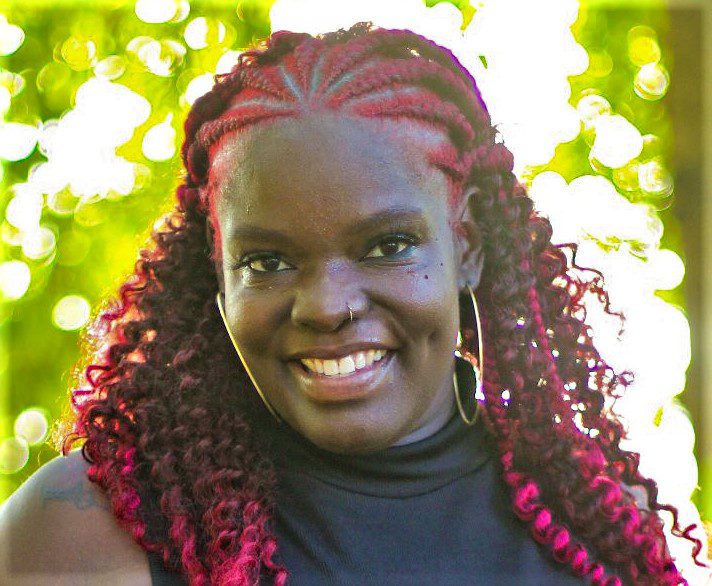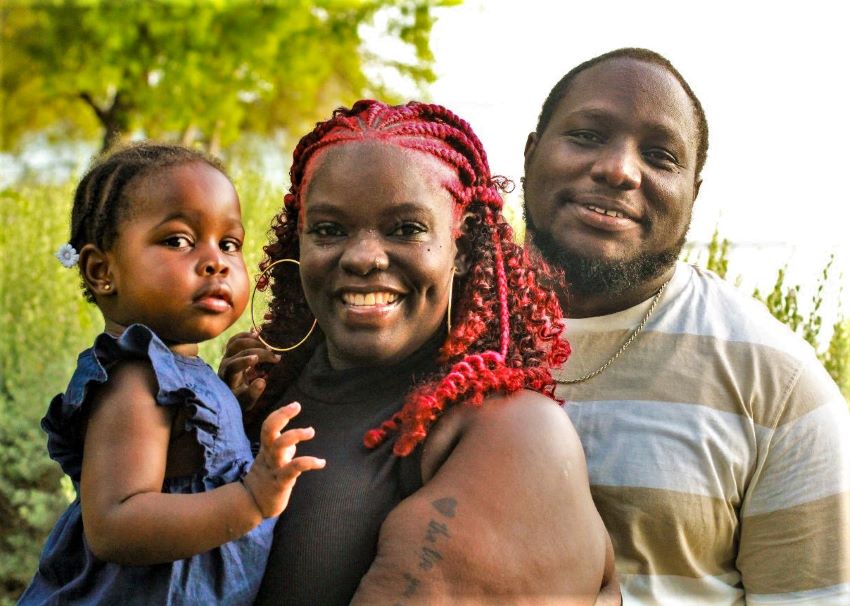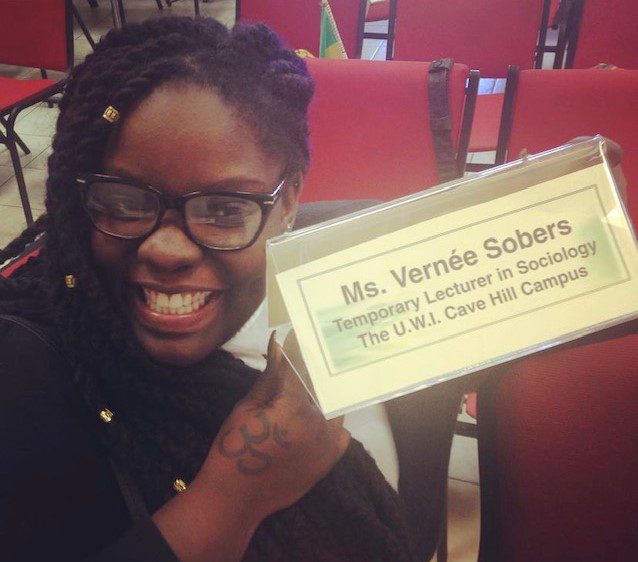
Vernée Sobers has been battling with mental illness for 25 years. She received her first mental health diagnosis at the tender age of 11. At a time when her peers were adjusting to life in their new secondary schools, following the Common Entrance Examination, she was already fighting a much larger and unseen opponent – depression.
As if that wasn’t enough, the now 36-year-old was also diagnosed with Bipolar Disorder in 2013, as well as prolonged post-partum depression in December 2022, after giving birth to her daughter in July 2021. She also has two non-communicable diseases (NCDs) – diabetes and hypertension.
Despite all of this, Vernée uses her experience with mental illness and NCDs not as a crutch but a platform to help others cope. What’s even more remarkable, are her many achievements while fighting these battles. She was a Lecturer at The University of the West Indies (UWI), Cave Hill Campus, and holds a degree in Criminology and Forensic Psychology.
Earlier this year, she used the stage at the PAHO/WHO and Ministry of Health and Wellness’ small island developing states (SIDS) High-Level Technical Meeting on NCDs and Mental Health to encourage persons to take care of their physical and mental well-being. This event was the precursor to the upcoming Ministerial Meeting on NCDs and Mental Health, which will take place from June 13 to 16, at the Lloyd Erskine Sandiford Centre, Two Mile Hill, St. Michael.
Vernée was one of the featured persons from around the region who shared their lived experiences with mental health challenges and NCDs, at the SIDS High-Level Technical meeting.
“My parents, like most others from the old school, did not understand what was mental illness. These were baby boomers, they automatically thought, mental illness what’s that? That doesn’t exist. We don’t have time to have mental problems.
“That time has passed; we do have time to deal with mental health problems. During that time, they paid for me to see a psychiatrist even though they didn’t understand what I was going through. They saw their daughter suffering and they tried to help me,” she explained.
At age 18, Vernée enrolled at The UWI, but there were times when she would go un-medicated for extended periods because she didn’t want to ask her parents for money to visit the doctor. Unfortunately, while trying to cope with her mental health condition she was diagnosed with diabetes in 2010, and a few years later, with hypertension.
“I will never forget the day my family doctor told me I was diabetic. My parents were overseas and I called my mother crying. I said ‘mum, I’m diabetic’, and she said ‘It’s going to be okay.’ I told her ‘no’ that I was going to die because I’m diabetic and all of you all are diabetic and I had a full-scale panic attack.

“She asked me if I wanted her to come home and I said ‘no’, that I would go stay by my granny. I went by my gran and she said well, ‘I’ve been diabetic for a long time and I am still alive.’ We have to also consider the impact of mental health and diabetes. Five years later, I was diagnosed with hypertension. Nearly everyone in my family is either diabetic or has hypertension,” she recounted.
A staggering 40 per cent of the Barbadian population, age 25 and over, is either hypertensive or is being treated for hypertension, according to statistics from the Ministry of Health and Wellness. Additionally, 26 per cent of Barbadians in that age group have reported they have diabetes or when their blood sugar is tested, they fall into that category.
When Vernée went to pursue her master’s degree in England, she confessed that she did not prioritise taking her meds for her mental health condition. She admitted this took a toll on her.
“My parents, like most others from the old school, did not understand what was mental illness. These were baby boomers, they automatically thought, mental illness what’s that? That doesn’t exist. We don’t have time to have mental problems.
“That time has passed; we do have time to deal with mental health problems. During that time, they paid for me to see a psychiatrist even though they didn’t understand what I was going through. They saw their daughter suffering and they tried to help me.”
Vernée Sobers
“I also went un-medicated in London for a very long time because I figured I didn’t have time to go see someone; I didn’t have time to take medication. I was working and going to school because I have expensive tastes; I have champagne mouth and mauby pockets. I shopped online all of the time because there were cute clothes, bags and shoes. Many days, I ate instant mashed potatoes because I could not call and tell my mother that I don’t have any money because I bought a pants from ASOS the day before.
“So, I went long periods without medication, and long periods without speaking to someone [professionally, regarding my mental health]. Any of you who have ever been to London know that it is a pretty gloomy place. The entire year-and-a-half I was there, I saw sunshine for about two weeks and I was never so excited. But then when the sunshine went away, my mood dropped all over again and I went back to the same routine,” she stated.
When she returned to Barbados with her master’s in Criminology and Forensic Psychology, finding a job was not easy. She decided to volunteer “at a lot of places” until something more lucrative came along, but the trend of being off her medications continued. Soon enough, her diabetes spiralled out of control.

“I went to see an endocrinologist and he said to me ‘Vernée, you’re not handling life well.’ and I said ‘yes, I know.’ He said he knew someone that I could go and see for free, and gave me the name of my new psychologist, who I see at the Edgar Cochrane Polyclinic.
“I thank the Ministry of Health for that because I never knew, before then, that we even had access to free therapy in Barbados. But, along with that, there was the stigma of going to the polyclinic. I said to myself, you have a bachelor’s and a master’s with merit, how dare you drive your car into the polyclinic? You know, we automatically think that polyclinics are only for certain people. But then I had to suck it up because I was broke,” Vernée recalled.
The initial embarrassment she felt soon gave way to confidence in the quality of service she received, and still receives, through the polyclinic system.
“A staggering 40 per cent of the Barbadian population, age 25 and over, is either hypertensive or is being treated for hypertension, according to statistics from the Ministry of Health and Wellness. Additionally, 26 per cent of Barbadians in that age group have reported they have diabetes or when their blood sugar is tested, they fall into that category.”
“That stigma went away for me by the time I had my [second] session. Now, I drive into the polyclinic with my music blaring and everyone knows me. We have to get away from that stigma. That’s why a lot of persons don’t seek help for their issues because automatically once they hear free healthcare and we have to go to the polyclinic or the Queen Elizabeth Hospital, they don’t want to go. I am thankful, once again, to the Ministry of Health for the fact that we have these services at the polyclinics because they are indeed a blessing,” she asserted.
Vernée also acknowledged the care and professionalism shown by doctors and nurses at the Queen Elizabeth Hospital when she spent a week on Ward C4 in 2020, after suffering a nervous breakdown.
She maintains that Barbados’ human capital is its greatest resource when it comes to mental health and NCDs. She said she was “amazed” at the care and attention she was given at the hospital, during what she termed as “the worst time of my life”.
She encourages persons with mental health challenges and those living with NCDs to make their health a priority. The UWI Lecturer believes it is because of the professional help she has received over the years that she has been able to rise above her challenges.
“I want persons to understand that when we invest in ourselves, we invest in our country. So for us to be able to make a change, we have to accept and acknowledge that mental health is serious. Don’t think that you are exempt, you are not. Whether you have a doctorate, are a doctor or whether you have nothing behind your name but experience, you have to take care of you.

“During COVID-19, we were made to realise that our mental health is one of our biggest challenges. We need to address that. I am a person with lived experience for 25 years, who has still gone on to achieve all of her goals and dreams, including getting married and having a daughter,” Vernée shared.
Persons who need to access mental health services may do so, free of cost, by contacting or visiting any of the island’s polyclinics. In the event of a crisis, Community Mental Health Officers are attached to all polyclinics, and may be accessed at these centres Monday to Friday, 8:30 a.m. to 4:30 p.m.
Similarly, those who need help may also call the Psychiatric Hospital’s Assessment Unit, at 536-3091, which is accessible 24 hours a day, or they may visit the hospital’s Black Rock, St. Michael location. Additionally, the Psychiatric Hospital conducts a Child and Adolescent Mental Health Clinic.
Other mental health helplines include the following: the Queen Elizabeth Hospital’s 24-hour hotline – 536-4800; Network Services Centre Inc. – 228-3056, or 228-7773, and emergencies – 231-6988; CASA Crisis Hotline – 264-7151; Men’s Empowerment Network – 826-0615; and the Substance Abuse Foundation (addiction and other mental health counselling) – 243-0038, or 433-3488.
